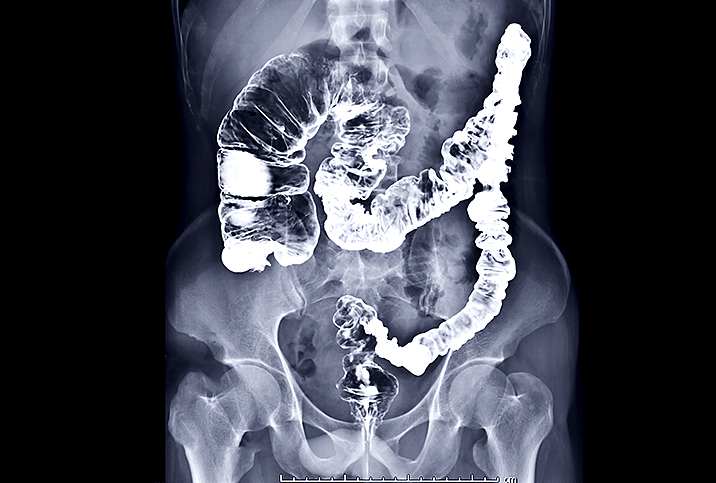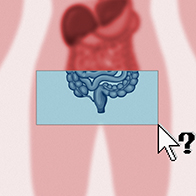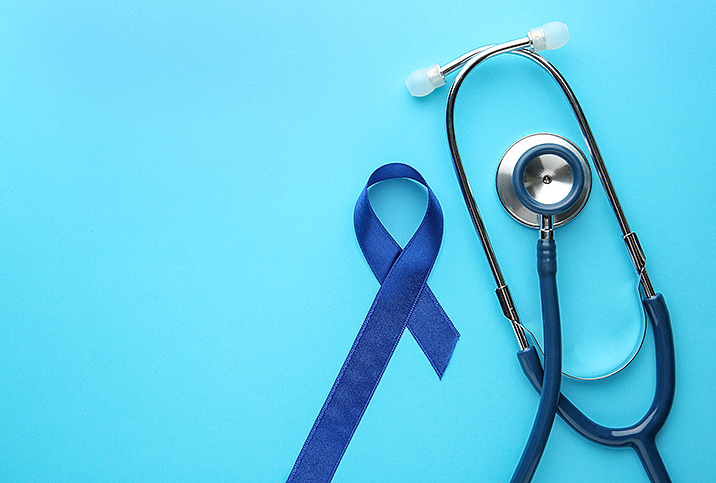Why the Colorectal Cancer Screening Recommendations Changed

Conventional wisdom and previous medical recommendations stated that a person should start being screened for colorectal cancer at around age 50. Recently, the U.S. Preventive Services Task Force lowered its recommended age for colorectal cancer screening to 45.
John B. Wong, M.D., a member of the task force since 2018 and the interim chief scientific officer at Tufts Medical Center in Boston, explained the change.
"Every five years or so, we take a new look at the evidence, and one of the things that we do when we look for the scientific evidence is we look at the incidence of colorectal cancer," he said. "When we looked at the most recent data, it showed that there are increasing rates of colorectal cancer in people younger than 50."
Overall, the lifetime risk of developing colorectal cancer is about 1 in 23 (4.3 percent) for men and 1 in 25 (4 percent) for women, according to the American Cancer Society.
The benefits of earlier screening
Wong said the increase in colorectal cancer rates in people younger than 50 caused scientists to look into whether earlier screening could prove helpful in saving lives and reducing the harm done by the disease. Scientists used data from stool screening trials and computer simulation modeling studies to weigh the benefits versus the disadvantages of earlier screening.
"We found that lowering the screening age to 45 would help people live longer and healthier lives," Wong said. "Age 45 is the new age at which to start colorectal cancer screening."
While the newly dropped screening age is helpful for people who are proactive about their health choices, it shouldn't diminish the importance of colorectal cancer screening after the age of 50.
"What's still really important to emphasize is that there's strong evidence supporting the benefit of screening people ages 50 to 75, where, sadly, some 1 in 4 people have never taken advantage of being screened and lowering their chance of dying from this devastating disease," Wong said.
Cancer screenings typically have a minimal impact on a person's habits and routines. Various methods are helpful for detecting cancer before it develops and becomes deadlier, and they can also discover potentially cancerous polyps while still benign.
'There's strong evidence supporting the benefit of screening people ages 50 to 75.'
"Not only can you detect colorectal cancer earlier with colorectal cancer screening, but you also have the opportunity to prevent colorectal cancer because, depending on the screening test results, you can pick up benign lesions that are potentially precancerous," Wong continued. "You can actually, at colonoscopy, remove that risk of potential future progression."
Wong said benign polyps can progress to a cancerous state in approximately five to 10 years, a window of time that helps articulate the change in recommended screening age from 50 to 45.
With the right timing and treatments involved, medical professionals are fairly successful at colorectal cancer intervention.
While some people may think screening involves being bombarded with X-rays or having their colon invaded by a doctor, the truth is simpler and the proof is in the stool.
Colorectal cancer screening methods
When discussing cancer screenings and images of the inside of the body, most people think of radiation. Actually, a variety of screening modalities are available for colorectal cancer and not all of them involve radiation exposure, Wong noted.
In fact, stool analysis is one of the better methods of screening. The stool is screened for blood or other materials that might draw concern from doctors.
"I will say that the stool tests are very good at picking up cancers—not quite as good at picking up these benign, potentially premalignant polyps," Wong said. "They do have to be done a bit more frequently, every one to three years, and what's really important to know is it's the initial screening test for, say, blood or other material."
'I will say that the stool tests are very good at picking up cancers—not quite as good at picking up these benign, potentially premalignant polyps.'
The next typical resource for colorectal cancer screening involves direct visualization.
"Only one of the direct visualization screening tests involves a CT scan, which would involve some potential radiation," Wong said. "When I say 'direct visualization,' you're basically using a scope or a long tube to look at the surface of the colon and see if you see any lesions."
He said other than the test involving a CT scan, none of the direct visualization options involve exposure to radiation.
When suspicious materials are detected or other red flags arise from a stool screening, a follow-up direct visualization is required to know how to best move forward, Wong explained, adding that a colonoscopy is probably the most common follow-up in these cases.
A colonoscopy can include the removal of potentially dangerous polyps, which can lead to bleeding or other potential complications. But the associated risks are heavily mitigated because a colonoscopy and other direct visualization procedures are conducted in a hospital or healthcare setting under the supervision of trained professionals.
Radiation as an essential healing resource
Some people think about the cumulative effects of radiation and undergoing other screening procedures for various conditions, and the anxiety can prevent proactive action. But even when radiation is applied as a treatment option, which tends to involve much more intense levels, doctors can be very precise and careful with the big picture of your life and health in mind.
"Radiation is scary to hear, and it's something that the public doesn't fully understand," said Amar U. Kishan, M.D., a radiation oncologist at the David Geffen School of Medicine at the University of California, Los Angeles. "Nobody wants to expose themselves to radiation, but it is a very effective treatment for many, many cancers. It's oftentimes a curative treatment, whether it's done instead of, before or after surgery."
Plus, remarkable advances in technology may mitigate the common side effects that generally concern people, Kishan added, though he admitted side effects are still possible when undergoing radiation treatment.
Kishan also made a point to say all professionals are subject to certain biases or unique viewpoints as a result of their own clinical or research experiences. While different medical professionals may form different hypotheses in terms of causality or best-case treatment options, the conventional wisdom for oncological care generally is that a collaborative treatment effort is imperative. Radiation oncologists such as Kishan are sensitive to patient concerns about the use of radiation and its perceived potential to treat one illness while creating another.
"We want to be aware of the fact that our treatment [has] caused side effects, but we should also be aware of the fact that these things are continuously improving and many patients are quite happy after radiation," he said.
Colorectal cancer comes with unique concerns over treatment that might not be as relevant in a gynecological- or urological-focused course of treatment.
"Some people have cancer of the rectum itself," Kishan said. "In that case, obviously, the rectum is receiving a high dose of radiation, as well."
He added that in cases where the rectum or surrounding areas experience exposure to radiation, a patient's medical history often includes a number of other treatments or partial treatments, which may have unique or overlapping potential consequences to those associated with radiation.
Final notes from the task force
Regardless of your age, working with a trusted medical doctor or advisor to establish a screening protocol that works best for you is a good idea.
Sexual and reproductive health conditions are sometimes associated with cancer, so if you encounter one such disorder, a doctor may feel that cancer screening is warranted, depending on various factors.
"Colorectal cancer is the third-leading cause of cancer death in the United States," Wong said. "We know that colorectal cancer screening saves lives, and people ages 45 to 75 should be screened. The task force continues to strongly recommend that people ages 50 to 65 be screened for colorectal cancer to lower their risk of dying from this devastating disease. And new science about colorectal cancer and people younger than 50 has allowed us to expand our recommendation to people ages 45 to 49."
Wong added that doctors may recommend screening to individuals older than 75 who have not been screened, but personal preferences and circumstances have to be taken into consideration at every age.
"For adults ages 76 to 85, the benefits and harms depend on an individual's overall health," he said.




















